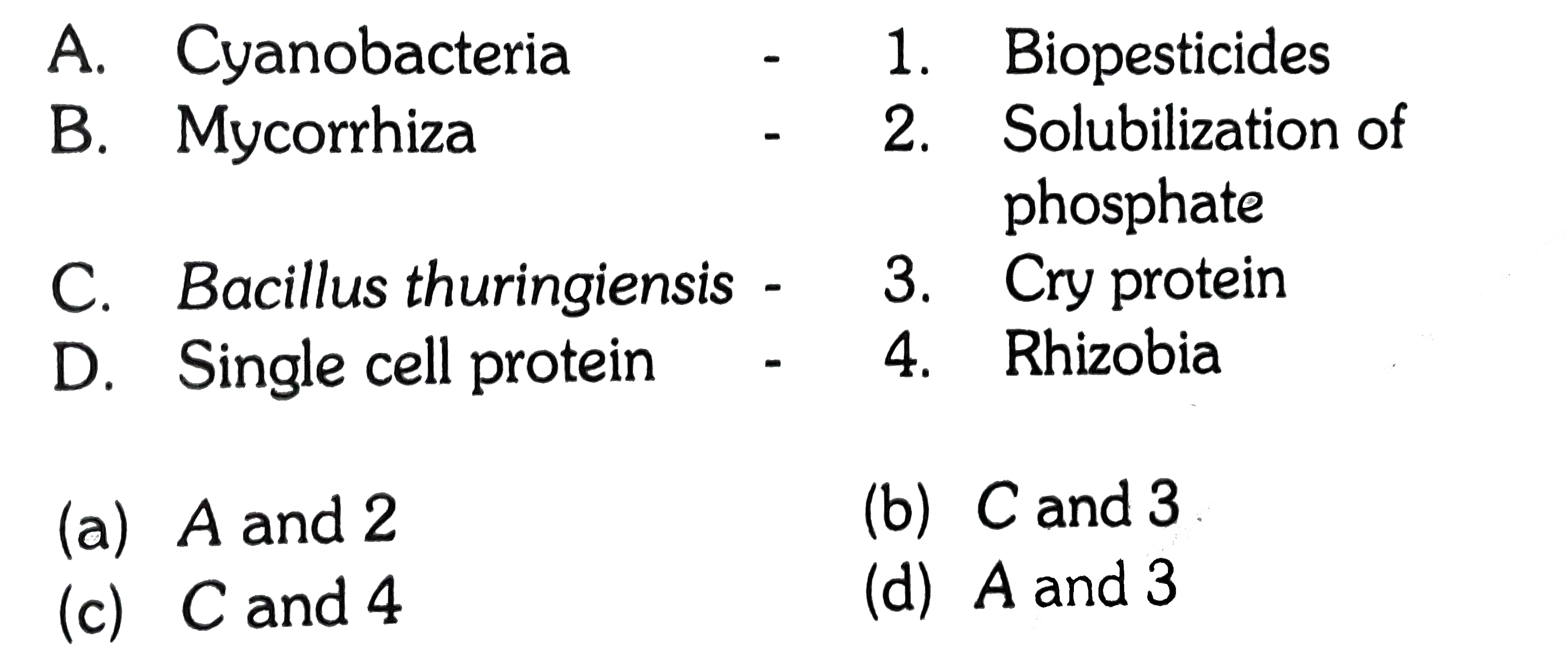Which is correctly matched
Agrobacterium tumefaciens - Tumour
pBR 322-Enzyme
Thermus aquaticus-Bt gene
Ligase - Molecular scissors
The correct Answer is:A
To solve the question "Which is correctly matched?" we need to analyze each option provided and determine if the pairs are accurately related.
1. Evaluate the First Option: Agrobacterium tumefaciens - Tumor
- Agrobacterium tumefaciens is a soil bacterium known for causing crown gall disease in plants. This disease results in the formation of tumors on the plant.
- Conclusion: This option is correctly matched.
2. Evaluate the Second Option: PBR322 - Enzyme
- PBR322 is a plasmid that was one of the first cloning vectors used in E. coli. It is not an enzyme; rather, it is a genetic element used for cloning.
- Conclusion: This option is incorrectly matched.
3. Evaluate the Third Option: Thermus aquaticus - Bt gene
- Thermus aquaticus is a bacterium that thrives in high temperatures and is known for producing Taq polymerase, an enzyme used in PCR (Polymerase Chain Reaction). The Bt gene, however, is derived from Bacillus thuringiensis, which is used for pest control in plants.
- Conclusion: This option is incorrectly matched.
4. Evaluate the Fourth Option: Ligase - Molecular scissors
- Ligase is an enzyme that joins DNA strands together. In contrast, molecular scissors refer to restriction enzymes that cut DNA at specific sequences. Therefore, ligase does not function as molecular scissors.
- Conclusion: This option is incorrectly matched.
Final Answer:
The only correctly matched pair is Option 1: Agrobacterium tumefaciens - Tumor.
---
- Agrobacterium tumefaciens is a soil bacterium known for causing crown gall disease in plants. This disease results in the formation of tumors on the plant.
- Conclusion: This option is correctly matched.
- PBR322 is a plasmid that was one of the first cloning vectors used in E. coli. It is not an enzyme; rather, it is a genetic element used for cloning.
- Conclusion: This option is incorrectly matched.
- Thermus aquaticus is a bacterium that thrives in high temperatures and is known for producing Taq polymerase, an enzyme used in PCR (Polymerase Chain Reaction). The Bt gene, however, is derived from Bacillus thuringiensis, which is used for pest control in plants.
- Conclusion: This option is incorrectly matched.
- Ligase is an enzyme that joins DNA strands together. In contrast, molecular scissors refer to restriction enzymes that cut DNA at specific sequences. Therefore, ligase does not function as molecular scissors.
- Conclusion: This option is incorrectly matched.
The only correctly matched pair is Option 1: Agrobacterium tumefaciens - Tumor.
Topper's Solved these Questions
- PRINCIPLES AND APPLICATIONS OF BIOTECHNOLOGYBOOK - DINESH PUBLICATION ENGLISHCHAPTER - PRINCIPLES AND APPLICATIONS OF BIOTECHNOLOGYEXERCISE - CYG
10 Videos
- PRINCIPLES AND APPLICATIONS OF BIOTECHNOLOGYBOOK - DINESH PUBLICATION ENGLISHCHAPTER - PRINCIPLES AND APPLICATIONS OF BIOTECHNOLOGYEXERCISE - Brain Teasers
5 Videos
- PRINCIPLES AND APPLICATIONS OF BIOTECHNOLOGYBOOK - DINESH PUBLICATION ENGLISHCHAPTER - PRINCIPLES AND APPLICATIONS OF BIOTECHNOLOGYEXERCISE - Brain Teasers
5 Videos
- PLATYHELMINTHES-THE FLAT WORMSBOOK - DINESH PUBLICATION ENGLISHCHAPTER - PLATYHELMINTHES-THE FLAT WORMSEXERCISE - check your grasp
9 Videos
- REPRODUCTION IN ORGANISMSBOOK - DINESH PUBLICATION ENGLISHCHAPTER - REPRODUCTION IN ORGANISMSEXERCISE - Check Your Grasp
19 Videos
Similar Questions
Knowledge Check
Which is not correctly matched?
ALaterite contain's aluminiumBTerra rosa- Most suitable for rosesCChemozen-Richest soilDBlack Cotton Soil-Rich in calcium carbonate
Find out the pairs, which are correctly matched

View SolutionWhich one is correctly matched?
View SolutionWhich is not correctly matched ?
View SolutionWhich is not correctly matched?

View SolutionWhich is not correctly matched :
View SolutionWhich one is correctly matched?
View SolutionWhich is not correctly matched?
View Solution
